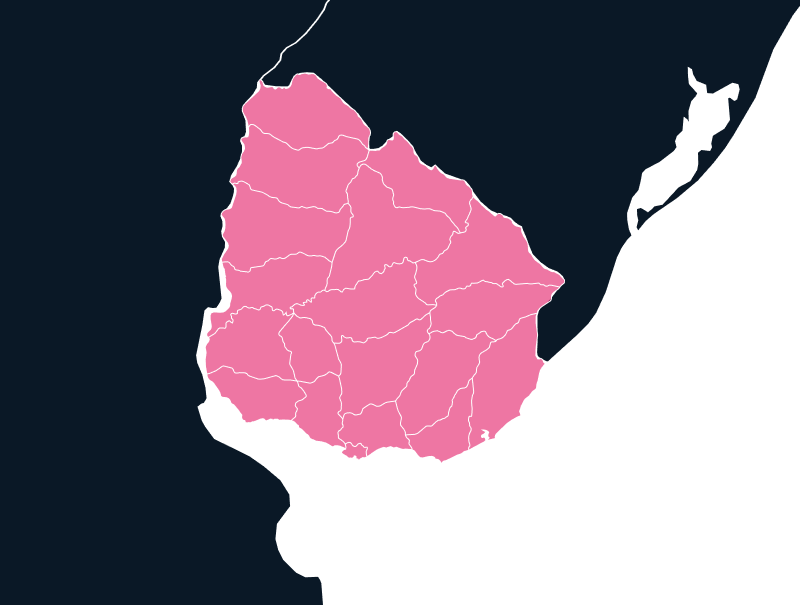Asia
Export and Import to Uruguay
Uruguay, an economically dynamic country nestled between Brazil and Argentina, offers unique opportunities for international trade. While the country’s import and export market is expanding, navigating its complex trade compliance regulations remains a significant challenge for businesses.

Tax
Up to 56%
Duties
Up to 22%
Lead Times
3-4 Weeks
Restricted Items
Extra Taxes on Goods of Certain COO
Best Carrier Option
Freight Forwarder or Courier
Non-Working Days
Saturday, Sunday, and Public Holidays
Prominent Lanaguages
Spanish
Importing into Uruguay
The country has invested heavily in information and communication technologies (ICT), making it a key regional player in the sector. However, despite its potential, Uruguay struggles to attract foreign investment due to its relatively high import taxes and complex trade compliance regulations.
Importers must navigate an array of bureaucratic hurdles, such as obtaining the necessary licenses and complying with strict product classification and technical regulation standards. For example, many goods, especially tech products, require pre-arrival import licenses to prevent costly delays at the port. The complexity of these requirements can discourage businesses without a local presence from entering the market.
Furthermore, Uruguay is increasingly focused on regulatory enforcement, which adds to the complexity of importing. Companies must stay up to date with shifting trade regulations and implement effective compliance strategies to avoid fines and other penalties. Dual-use goods, in particular, face stricter scrutiny, requiring businesses to enlist the services of an Importer of Record (IOR) to ensure compliance.
Exporting from Uruguay
Uruguay’s export sector is also on the rise, thanks in part to the country’s strategic location within MERCOSUR, the South American trade bloc. However, the export process comes with its own set of regulatory requirements. To export goods from Uruguay, businesses must first obtain an export license from the Ministry of Industry, Energy, and Mining. Depending on the type of goods being exported, additional permits or certificates may be required to comply with both Uruguayan and international regulations.
In addition to obtaining the necessary export documentation, traders must also submit electronic customs declarations to the National Customs Directorate (DNA). The DNA carefully reviews these declarations to ensure export compliance with local laws, and any errors or discrepancies can lead to delays or fines.
Similar to the import process, maintaining accurate and up-to-date records is essential for exporters. Businesses must implement robust record-keeping systems to track transactions, customs declarations, and communication with regulatory authorities to ensure smooth and timely processing of shipments.
Population
3.39M
Biggest Industry by Export
Beef and Beef Products
Capital City
Montevideo
Biggest Industry by Import
Machinery and Electrical Equipment
Specialized Solutions for Importing and Exporting in Uruguay
Despite these challenges, Uruguay offers opportunities thanks to its high literacy rate, strong digital infrastructure, and growing tech sector. TecEx specializes in helping businesses navigate these trade regulations. As an Importer of Record (IOR) and Exporter of Record (EOR), we ensure your goods are properly classified and compliant with all rules, avoiding costly delays.
Our Delivered Duty Paid (DDP) service takes care of all trade compliance aspects, from documentation to managing the import/export process. With our expertise, you can focus on growing your business while we handle the complexities of compliance.
Uruguay’s regulations can be tricky, but with the right partner, they’re manageable. TecEx provides seamless solutions, from managing licenses and customs declarations to offering guidance on Uruguayan tax compliance and risk management. We help your business stay compliant, minimize risk, and seize opportunities in Uruguay’s growing market.
With our support, businesses can confidently navigate Uruguay’s trade landscape and tap into its economic potential.
Leading Import/Export Partners of Uruguay
South America
Brazil
South America
Argentina
Compliance Challenges for Importing and Exporting in Uruguay
Importing into Uruguay comes with unique challenges. A major one is ensuring goods are accurately classified according to local standards, which helps avoid delays or higher tariffs. Importers must also provide a certificate of origin, which affects tariff rates and eligibility for preferential trade agreements.
Uruguay has high import taxes, which can increase the cost of foreign goods. These taxes are primarily a revenue source for the government, not intended to protect local manufacturing, so businesses should factor these fees into their planning.
Both importers and exporters need to follow the rules set by Uruguay’s National Customs Directorate. This includes submitting accurate electronic customs declarations, detailing product descriptions and values. Mistakes can lead to penalties or rejected shipments.
Another challenge is Uruguay’s constantly changing trade regulations. Updates, especially in risk management and customs enforcement, require companies to stay informed to avoid disruptions.
Important Dates
Businesses are usually closed during Holy Week, so expect delays in your shipping timelines.
Your Global Trade Solution for Exporting and Importing Uruguay
Fill in and submit the form, and our import/export team will contact you with a comprehensive customs compliance solution to match your Uruguayan trade needs.



